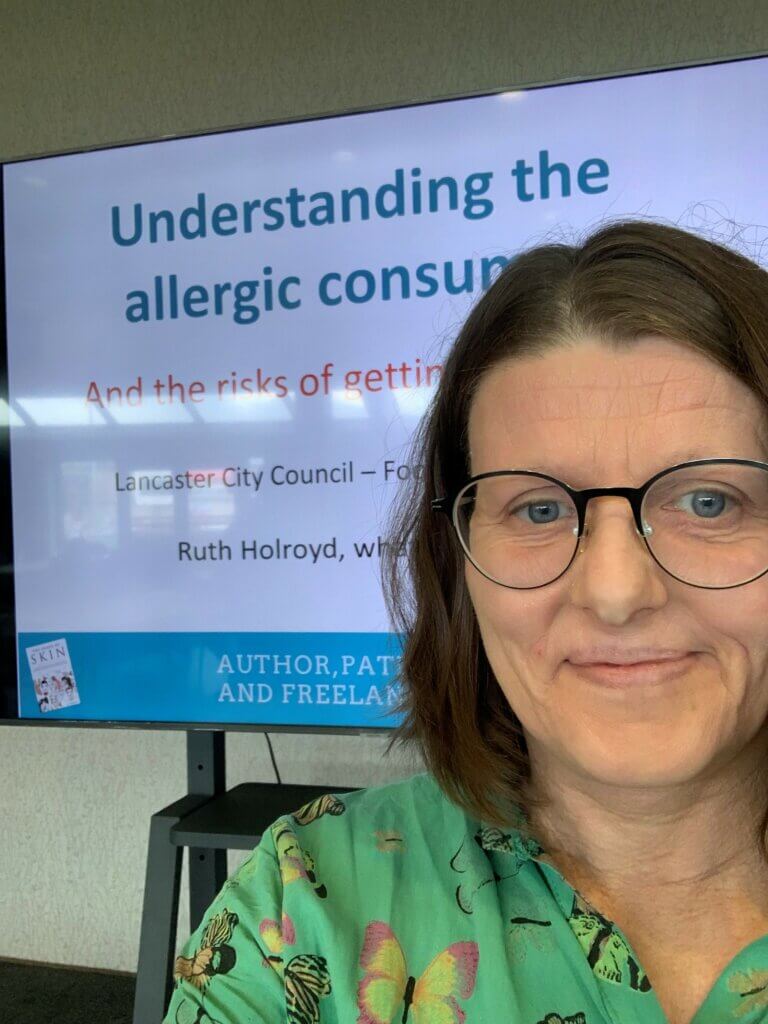This week I was honoured to attend as the guest speaker at the Lancaster Food Allergen Forum, at Morecambe Football Club in Lancashire. It was a fantastic opportunity to share the experience of the allergic consumer, some of the challenges and fears we face and what we’d like to see from food service businesses.
There were 50-60 delegates at this event which was great to see and it really was wonderful to be back at an in person event finally after so long spent presenting form home online.
\

Food Safety Forum agenda
- Fiona Inston – Welcome and opening
- Lizzi Watton – Food Safety and common myths
- Kevin Burge – Allergen Management in Food businesses
- Ruth Holroyd – Living with Anaphylaxis, a customer’s perspective
- Gary Singleton – PPDS, Food Labelling
- Lee Wojarski – Health and Safety
- Lucy Caldwell/ Lyn Page/ Daniel Clarke – Help for businesses
Understanding the allergic consumer
I shared my learnings of living with anaphylaxis, some of the good and bad eating out experiences that I’ve had over the years and also what we’d like to see happening as allergic consumers.
We’re not asking for the world, just respect and inclusion, and in my case just one safe item, that can quite simple. I’m not fussy what you I have (as long as my allergens are not present) and will often ask advice from the chef as to what he thinks is safest and easiest.
It’s more about being included and able to experience the eating out experience with friends and less about having loads of choice for me. But then as I begin a lot of talks, I’m most chef’s worst nightmare with multiple life threatening allergies. I’m severely allergic to all nuts (except almonds – make that make sense) and dairy. I also have a wheat and a soya allergy which cause asthma and stomach problems that are quite dramatic but so far not life threatening. They are all four officially diagnosed allergies so I need to be able to avoid them when I eat out – no mean feat!

What I learnt
I learnt so much about the sheer extent of challenges food businesses face in today’s competitive and fast moving environment, from changing legislation to staff shortages and more. It was also interesting to get an insight into the great work Trading Standards and Food Environment Officers do to keep businesses safe. There is a kind of myth that they are to be feared and not welcomed into a business, but their role is to help and support, not to hinder the success of any café or restaurant.
It was great to meet such a friendly team at Lancaster City Council and hear about the kinds of work they get involved with, from Covid awareness lately, to the more traditional business inspections.
Food safety myths I didn’t know about!
Lizzie Watton shared some really fascinating food and safety myths, and as the only non food safety expert in the room I was pleased to get most of them right. However I learnt a few things that make loads of sense once explained but that I had been wrong about.
- Do you need to wash watermelons before eating/cutting? Well I looked down horrified at the watermelon slices that I had with me as snack. I’ve never washed a watermelon in my life. Well you should wash them. There was a recent salmonella outbreak reported due to the bacteria being present on the outside of the fruit skin. Once you but into and you transfer the germs onto the inside fruit, the bit you do eat! Wash those melons everyone! Just warm running water should be enough.
- Is it safe to eat a fresh beef burger that’s cooked pink inside? NO IT’S NOT! And I’m pretty sure I’ve had quite a few very tasty pink cooked burgers. I always assumed that because you can eat a beef steak rare that burgers would be the same, but they’re not. Because the germs get cooked off the outside of the steak joint, this doesn’t happen to any germs trapped inside a rare burger! You have been warned! It could be OK but it could be dangerous if meat is contaminated from the abattoir, which is very expensive to test for.
- Is it better for your fridge to be completely full to run better and more efficiently? Again I’m sure I’ve been told that a full fridge stays colder and keeps food at the best temperature, costing you less money. It’s actually another myth and could mean tightly packed food can’t get proper air circulation around the food. If you are finding that your fridge is jam packed, you either need a bigger fridge or a second one!
Food Allergen Training and advice
I was so impressed that this training was offered free to all the businesses who were able to attend and lots of them did. Kevin Burge shared the 10 worst Allergen Fails (inspired by Heather Landex’s 10 ways to kill your customers) that can happen in a kitchen. I hope he doesn’t mind me sharing them here. He went into detail for each area, sharing what was going wrong and key tips and guidance for food service establishments to avoid making the same mistakes!
- Failure to communicate – Processes, listening skills and understanding
- Allergen matrix errors – These need to be correct and up to date
- Staff!!! – Must be trained
- Deep Fat Fryer – cross contamination
- Barista machines – those dirty rags and dairy/plant/nut milk cross contamination
- Sauces and garnishes – How were they made?
- Kitchen cloths – transference of allergens!
- Utensils, pans and reusable tubs
- Ice cream scoops – the jug of water
- Toasters – one crumb of wheat is enough to make a coeliac or wheat allergic person very ill
Had you considered any of these?
Getting help for your food service business
This free event was so helpful and well attended. If you want advice for your business here are some things you could try:
- Trading Standards Laws Explained – In depth guides
- Food Allergy Training for Food Businesses
- Gov.uk has LOADS of resources. Search for what you’re looking for to find information
- Look for Food Safety Courses in your local area – Lancaster will be running them throughout 2022
- LinkedIn – is a great hub for Food Allergen experts. Get involved in the discussions on there and make connections
- Your local Trading Standards and Environmental Health contacts may also be able to answer your questions and point you in the right direction
- Engage with local allergy customers, turn them into raving fans!
We need this across the country
I’d love to see this kind of training available across the UK. It’s only a tip of the iceberg and people need much more specialist allergen training but it’s a start, to get people thinking about possible problem areas.












Leave a Reply